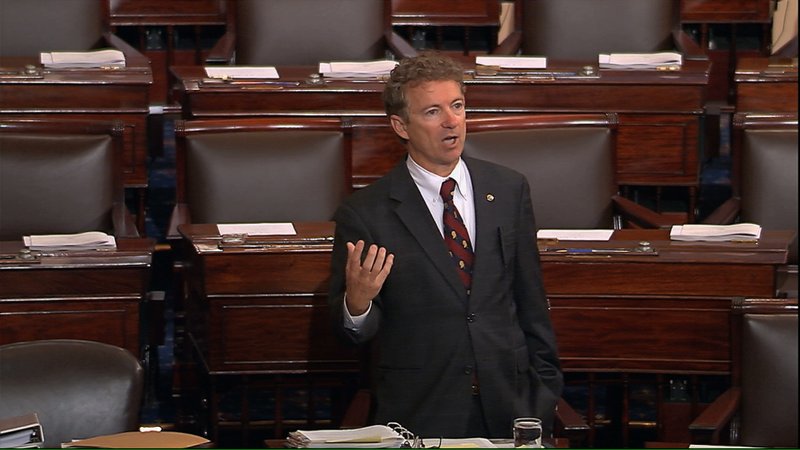WASHINGTON -- Republican presidential candidate Rand Paul commandeered the Senate floor Wednesday to deliver an hours-long protest against renewal of the USAPATRIOT Act, calling the law a government intrusion on Americans' privacy.
As Paul made his case, a Justice Department memorandum circulated on Capitol Hill warning lawmakers that the National Security Agency will have to begin winding down its bulk collection of Americans' phone records by the end of the week if Congress fails to reauthorize the law.
"After May 22, 2015, the National Security Agency will need to begin taking steps to wind down the bulk telephone metadata program in anticipation of a possible sunset in order to ensure that it does not engage in any unauthorized collection or use of the metadata," the department said.
Congress faces a June 1 deadline for the law's expiration.
"There comes a time in the history of nations when fear and complacency allow power to accumulate and liberty and privacy to suffer," the Kentucky senator said when he took to the Senate floor about noon. "That time is now, and I will not let the Patriot Act, the most unpatriotic of acts, go unchallenged."
The House overwhelmingly passed a bill to end the bulk collection, and Senate Majority Leader Mitch McConnell, R-Ky., has said the Senate will act on the issue before beginning a Memorial Day recess at week's end.
But McConnell, as well as presidential hopefuls Sens. Marco Rubio, R-Fla., and Lindsey Graham, R-S.C., favors extending the law. Final congressional approval before the deadline is no certainty.
Paul plunged into a lengthy speech declaring the USAPATRIOT Act unconstitutional and opposing renewal of the program.
"I don't think we're any safer looking at every American's records," Paul said.
Officials said it was possible the White House contender would hold sway until 11 p.m. CDT or later, but his office offered no word on his plans. Paul's campaign sent out a fundraising appeal, and his long-standing opposition to bulk collection has stirred social media.
As Paul approached the ninth hour of talking, several Democratic senators and two Republicans were giving him occasional breaks by speaking several minutes to ostensibly ask him questions. Paul kept control by yielding for questions without "yielding the floor" and by not sitting.
Although Paul called his action a filibuster, it technically fell short of Senate rules because it was considering a trade bill, not the USAPATRIOT Act.
If Congress fails to act, several key provisions of the law would expire, including the bulk collection; a provision allowing so-called roving wiretaps, which the FBI uses for criminals who frequently switch cellphones; and a provision that makes it easier to obtain a warrant to target a "lone wolf" terror suspect who has no provable links to a terrorist organization.
The Justice Department said that if Congress allows the law to expire and then passes legislation to reauthorize it when lawmakers return to Washington the first week of June, it would "be effective in making the authorities operative again but may expose the government to some litigation risk in the event of legal challenge."
Last week, the House backed the USA Freedom Act, which would replace bulk collection with a system to search the data held by telephone companies on a case-by-case basis. The White House backs the House bill and has pressed for the Senate to approve the legislation.
Information for this article was contributed by Charles Babington and Erica Werner of The Associated Press.
A Section on 05/21/2015

